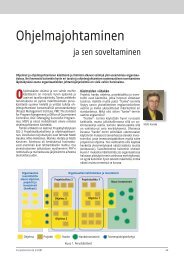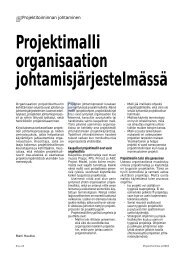Boundary activities and readiness for ... - Projekti-Instituutti
Boundary activities and readiness for ... - Projekti-Instituutti
Boundary activities and readiness for ... - Projekti-Instituutti
You also want an ePaper? Increase the reach of your titles
YUMPU automatically turns print PDFs into web optimized ePapers that Google loves.
Theoretical background<br />
task, <strong>and</strong> boundary spanners act as negotiators between organizations<br />
(Perry & Angle, 1979). This negotiator <strong>and</strong> representative role may<br />
contribute to maintaining or improving the organizational legitimacy <strong>and</strong><br />
image (Aldrich & Herker, 1977).<br />
The in<strong>for</strong>mation processing perspective has been criticized of viewing<br />
organizational members as instrumental in their in<strong>for</strong>mation transfer<br />
behavior, <strong>and</strong> of regarding knowledge as objective, external <strong>and</strong> explicit<br />
(Kellogg et al., 2006). While the study of boundary spanning has been<br />
dominated by the in<strong>for</strong>mation processing perspective, more recent research<br />
has taken alternative st<strong>and</strong>points. <strong>Boundary</strong> spanning has been examined<br />
as communication (Katz, 1982; Manev & Stevenson, 2001), coordination<br />
(Kellogg et al., 2006), <strong>and</strong> knowledge integration (Teigl<strong>and</strong> & Wasko,<br />
2003). In recent studies, boundary <strong>activities</strong> have been analyzed from<br />
knowledge-based <strong>and</strong> practice-based views (Carlile, 2004; Kellogg et al.,<br />
2006; Levina & Vaast, 2005). Recent research has also emphasized the<br />
cultural aspects of boundary spanning, <strong>and</strong> the political aspects of<br />
knowledge (Kellogg et al. 2006). These studies highlight how boundary<br />
spanning is not only about in<strong>for</strong>mation processing, but involves a wider set<br />
of purposes <strong>and</strong> <strong>activities</strong>.<br />
While many organizational positions involve interaction with elements<br />
external to the unit or the organization, certain positions involve intensive<br />
interaction with the environment (Aldrich & Herker, 1977). People in such<br />
positions have been given a wide range of names in the literature. They<br />
have been called boundary spanners (Leifer & Delbecq, 1978), boundary<br />
role persons (Perry & Angle, 1979), boundary spanning individuals<br />
(Tushman & Scanlan, 1981a, 1981b), gatekeepers (Allen & Cohen, 1969;<br />
Tushman & Katz, 1980), <strong>and</strong> boundary spanners (Levina & Vaast, 2005;<br />
Nochur & Allen, 1992). Previous research has acknowledged how project<br />
<strong>and</strong> program managers are in an important boundary spanning position<br />
(Wilemon & Cicero, 1970; Wilemon & Gemmill, 1971). Especially in a<br />
matrix organization, project managers need to balance between the<br />
requirements of the project <strong>and</strong> those of the functional organization.<br />
Indeed, many of the core responsibilities of project <strong>and</strong> program managers<br />
are essentially boundary spanning <strong>activities</strong> (Wilemon & Cicero, 1970).<br />
Being in a boundary spanning position can have both positive <strong>and</strong><br />
negative consequences <strong>for</strong> the individual. <strong>Boundary</strong> spanners make<br />
decisions on what in<strong>for</strong>mation passes through the boundary, to whom,<br />
when, <strong>and</strong> in which <strong>for</strong>m. They may become powerful within the<br />
organization, as the organization relies on their expertise <strong>and</strong> discretion<br />
(Aldrich & Herker, 1977; Spekman, 1979). Being in a boundary role permits<br />
individuals to improve their bargaining position <strong>and</strong> thus increase their job<br />
63









